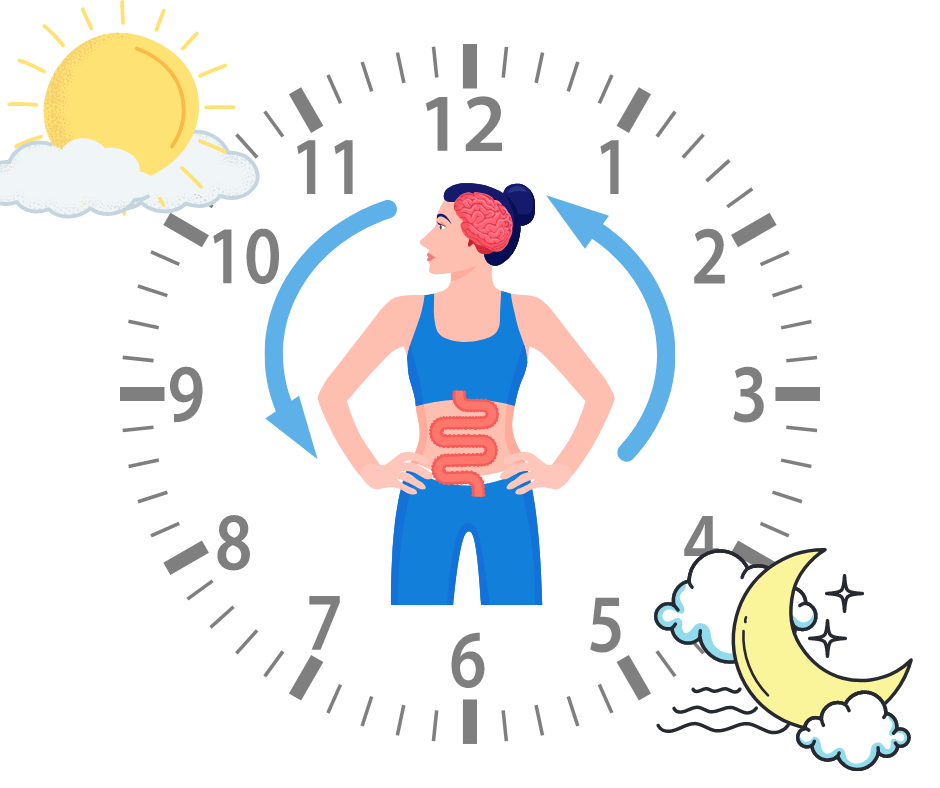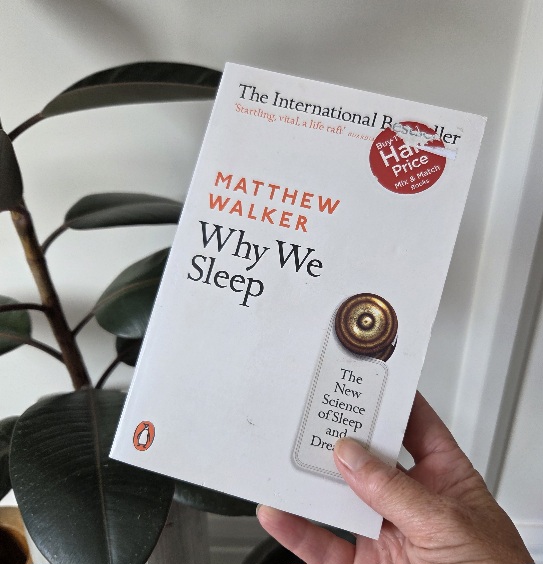Sleep Crisis: Is Good Gut Health The Key?
More and more people are becoming aware of the connection between the gut and the brain, a fascinating relationship known as the Gut-Brain Axis, which plays a crucial role in shaping our moods and mental health. However, there’s another remarkable connection that often goes unnoticed—the intricate link between sleep and the gut which I like to call “the gut-sleep connection”.
In our fast-paced lives, it’s easy to underestimate the importance of sleep. Yet, sleep is not merely a nightly break from the world; it’s a fundamental pillar of our physical and mental well-being. During this restful downtime, our bodies undergo a profound process of energy restoration, critical body function maintenance, and muscle tissue repair. Moreover, it’s the time when our brains diligently sift through the vast influx of daily information, all while maintaining the connection between sleep and the gut. In essence, sleep is as vital to our health as nourishment and hydration.
However, a stark reality confronts us: according to the ‘Need for Sleep’ study, a staggering 71% of UK adults do not obtain the recommended 7-9 hours of sleep per night. The consequences of this sleep deficit extend far beyond mere grogginess. Insufficient sleep can impact our memory, cognitive abilities, emotional regulation, and overall well-being, influencing the gut-sleep connection. Over time, chronic sleep deprivation can escalate the risk of obesity, and depression, weaken our immune defenses, jeopardize heart health, elevate the risk of diabetes, and even diminish our libido.
But what’s the connection between this sleep crisis and our gut health and how does it relate to the gut-sleep connection? In this blog post, we’ll delve into the intriguing interplay between sleep patterns, gut function, and the stress that often keeps us awake at night. Join me on this journey to uncover the hidden secrets of the gut-sleep-stress relationship and explore how mindful practices like breathwork can be the key to a more peaceful night’s rest.
Are You Sabotaging Your Sleep
Inside our bodies, there are tiny internal clocks working hard to guide our sleep-wake cycle. Think of them as the conductors of our sleep orchestra, deciding when it’s time to rest and when it’s time to rise. The most important conductor lives in our brain, telling us when to sleep. But did you know we have other conductors in our gut and various organs too?
These internal clocks love routines and follow a 24-hour schedule called the “circadian rhythm,” crucial for the gut-sleep connection They rely on natural cues like daylight and darkness to make us feel alert or tired. However, our modern way of life often disrupts this beautiful harmony. Think about it: The bright artificial light, especially the blue glow from our phones and screens late at night, can confuse these internal clocks. They make it tougher for us to feel sleepy when we should. And don’t forget about caffeine, like the kind found in coffee and energy drinks – it can block the signals that tell us it’s time to rest.
Now, here are a couple of questions for you:
Do you ever catch yourself watching TV until the wee hours, scrolling through social media endlessly, or gaming late into the night? Maybe you even go out with friends when you’re bone-tired but resist heading to bed. If any of this sounds familiar, you might be a victim of what’s known as “bedtime procrastination.”

Have a think. Are you unintentionally delaying your bedtime because you’re seeking a little more leisure time after a long day?
Impact of the Gut
But here’s the twist: these internal clocks aren’t just in our brains; they’re also in our gut, playing a crucial role in the gut-sleep connection. This gut clock directly influences the trillions of microbes that make up our gut microbiota, sometimes called the gut microbiome. These microbes are like the unsung heroes of our immune system, maintaining a delicate balance between the good and bad ones to ensure our internal ecology stays healthy and balanced.

Most of this microbial activity takes place at night when we’re fast asleep, influencing the gut-sleep connection. Our gut relies on clear cues from the internal clock to differentiate between daytime and nighttime activities. For example, during the night, our body stimulates melatonin production, which encourages the activity of white blood cells designed to respond to harmful bacteria in your gut. During the daytime, it’s the bacteria’s turn to feed and produce metabolites that benefit our health. In other words, a clear and reliable internal clock is essential for maintaining balance in your gut.
Source: Lights Out! T.S. Wiley and Bent Formby, Ph.D., NY: Pocket Books, 2000, pp. 48-51, 53
But sleep is just one piece of the puzzle within the context of the gut-sleep connection. Your gut health is influenced by various factors, including diet, medication, exercise, and more. It’s not only about what you eat but also how your gut processes it. The balance in your gut microbiome, the community of microorganisms residing there, is crucial. It doesn’t just impact your gut; it’s a cornerstone of your overall health. The state of your gut microbiome can influence your immune system, mood, and even your weight.
Now, let’s shift our focus to another crucial factor: stress. Stress can have a significant impact on both your sleep and your gut health. Let’s explore how the interplay between stress, sleep, and the gut shapes your well-being.
The Stress-Sleep-Gut Connection: A Vicious Cycle
Stress is a formidable force that can significantly disrupt two critical aspects of our well-being: sleep quality and gut health. It’s a domino effect that starts in the brain, affecting the production and function of key neurotransmitters like serotonin and dopamine.
As stress levels rise, these essential neurotransmitters, which play a pivotal role in regulating digestion, mood and sleep, can become imbalanced. This imbalance can lead to sleep disturbances, affecting both the rhythm and quality of your rest. The hormones and neurotransmitters that control our circadian rhythm can be thrown off-kilter, perpetuating a cycle of poor sleep.
But the consequences of stress don’t stop there. It also wreaks havoc on your gut health. Stress alters the delicate balance of bacteria in your gut, leading to increased intestinal permeability, often referred to as “leaky gut.” This condition impairs digestion and can cause inflammation, giving rise to uncomfortable symptoms such as bloating, abdominal pain, diarrhoea, or constipation.
The intertwining relationship between stress, sleep, and gut health creates a vicious cycle. Poor sleep quality exacerbates stress, which in turn negatively impacts gut health. This cycle can take a toll on your overall well-being, emphasizing the importance of understanding and addressing the gut-sleep connection.

Serotonin: A Neurotransmitter that is produced in the brain and in the gut. Serotonin is best known for its ability to boost your mood, but it also plays an important role in sleep, digestion and the immune system. around 90% of serotonin is produced in the gut.
Dopamine: Another neurotransmitter produced in the brain and the gut that is known as the ‘feel-good’ neurotransmitter because it activates the reward system in your brain. Dopamine has many roles in the body including management of heart rate, pain, sleep and kidney function. About 50% of dopamine is produced in the gut.
So what can we do to break this pattern? Let’s explore some simple habits that can improve both sleep quality and gut health. By addressing stress through mindful practices and making positive lifestyle changes, you can regain control of your well-being and find balance once more.
Finding Balance: Supporting the Gut-Sleep Connection

Find out how good your sleep quality is by taking part in the Sleep Census being conducted in collaboration between BBC Two Horizon and Prof. Colin Espie at the University of Oxford. You can take the test here.
Now that we’ve explored the intricate connection between stress, sleep quality, and gut health, it’s time to regain control of your well-being. Here are some practical tips to help you improve both your sleep and gut health:
- Embrace Sleep Hygiene: Establish a bedtime routine that signals to your body it’s time to wind down. Turn off electronic devices at least an hour before bed to avoid the disruptive effects of blue light. Ensure your sleeping environment is conducive to rest, with a comfortable temperature, darkness, and even some white noise if it helps you to relax.
- Mindful Eating For Gut and Sleep: Pay attention to your diet.
- Reduce caffeine intake, especially in the afternoon & evening as it can interfere with sleep hormones and neurotransmitters.
- Avoid foods that harm or irritate the gut microbiome, like processed foods, alcohol, refined sugar and foods that you are intolerant to, such as gluten and dairy.
- Consider the timing and quantity of meals. Eating too much or too little can cause discomfort and disrupt sleep, as can eating too late.
- Regular Exercise: Engaging in regular physical activity can significantly reduce stress levels, improve sleep quality, and promote a healthy gut. Aim for at least 30 minutes of moderate exercise most days of the week.
- Maintain a Consistent Sleep Schedule: Try to go to bed and wake up at the same times every day, even on weekends. Consistency helps regulate your internal clocks and can improve sleep quality.
- Engage in Stress Management Techniques: Incorporate mindfulness practices into your daily routine. Try journaling or making to-do lists to clear your mind before bedtime. Explore breathwork exercises, like deep breathing or meditation, to calm your nervous system and ease stress. Consider incorporating sleep meditation to guide you into a restful slumber.
4-8 Breathwork for Better Sleep
As you’ve discovered in this blog post, the gut-sleep-stress connection is a complex web of interactions that profoundly impact our well-being. To help you on your journey towards improved sleep and gut health, I’d like to introduce you to a simple yet powerful breathwork practice: the 4-8 Breathwork.
The 4-8 breathwork technique is a quick and effective way to calm your nervous system, reduce stress, and prepare your body and mind for restful sleep. It’s a practice you can easily incorporate into your nightly routine, and it works in perfect harmony with the principles discussed in this blog post.
I invite you to give the 4-8 Breathwork practice in this video a try as part of your nightly routine. Use it as a gentle transition from the demands of the day to a state of deep relaxation. By incorporating this breathwork practice into your life, you can take a proactive step towards better sleep and enhanced gut health. Remember that consistency is key, so practice it regularly, especially if you’re experiencing stress-related sleep issues.
To explore the practice of Breathwork further and unlock its full potential, consider joining my upcoming 4-week breathwork course, where you’ll delve deeper into breathwork techniques and mindfulness practices that can transform your sleep patterns and overall well-being. Register your interest here.
Restoring the Gut-Sleep Connection
In conclusion, the gut-sleep-stress relationship is a complex but crucial one that affects our overall well-being. By making mindful choices, managing stress effectively, and adopting healthier habits, you can restore harmony to your mind, body, and gut. Remember that small, consistent changes can lead to significant improvements in your quality of life.
Book Recommendation
If this blog post has piqued your interest in the fascinating world of sleep I highly recommend this book by Matthew Walker. Why We Sleep explores what sleep is and how it affects our health and happiness.

Gut-Centric Wellness: Your Guide to Optimal Health
Hello, I’m Nikkie, a Certified Nutritionist, Health Coach, and Breathwork Coach with a passion for holistic well-being. With personal experience in overcoming gut issues, I’ve embraced a gut-centric approach in my practice. Why? Because the gut is the foundation of our overall health, impacting everything from digestion to mood.
I believe in the power of personalised guidance and a structured journey. That’s why I offer a comprehensive 12-week program designed to empower you on your health journey. Together, we’ll address your unique needs and preferences, creating sustainable changes that last. Whether you’re seeking to improve your gut health, manage stress, or achieve other health objectives, I’m here to guide you every step of the way.
To learn more about my approach and how it can benefit you, book a Gut Conversation TODAY. Let’s embark on this transformative journey to a healthier, happier you.

Are You Ready to Change Your Gut Story?
You don’t have to manage this alone. Take the first step to feeling better today.

